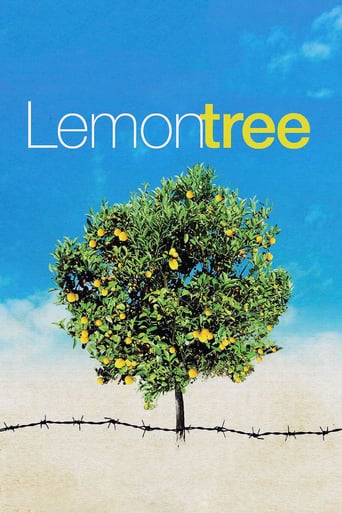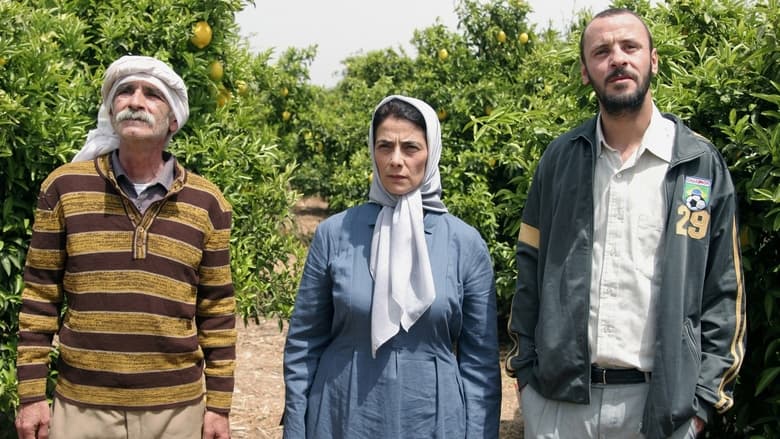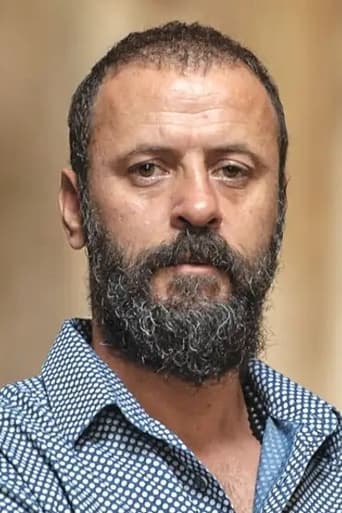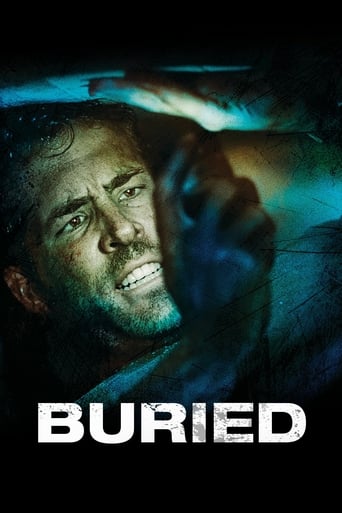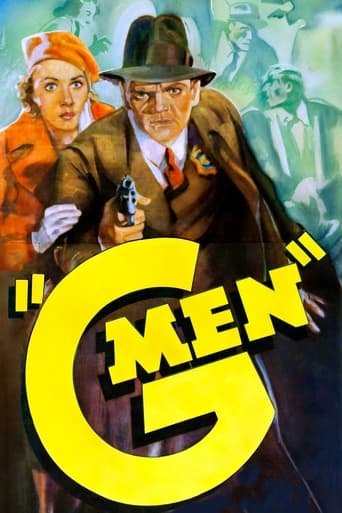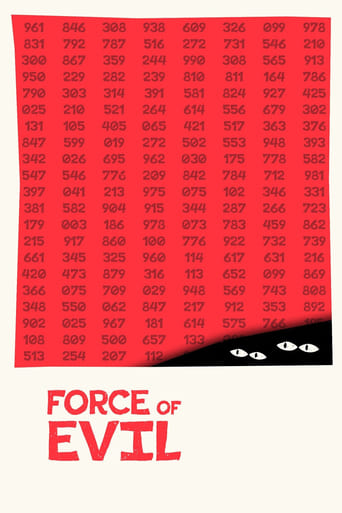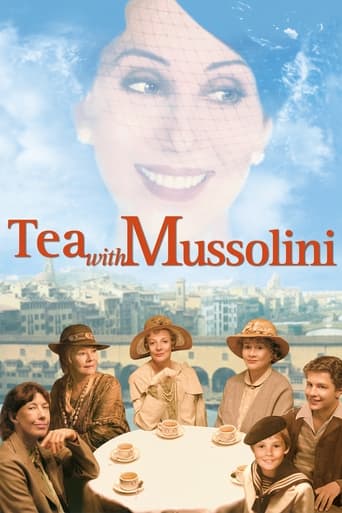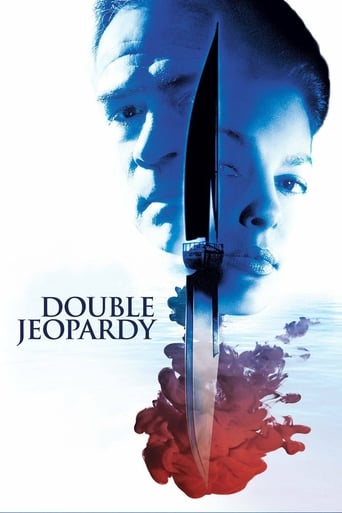Lemon Tree (2008)
Salma Zidane, a widow, lives simply from her grove of lemon trees in the West Bank's occupied territory. The Israeli defence minister and his wife move next door, forcing the Secret Service to order the trees' removal for security. The stoic Salma seeks assistance from the Palestinian Authority, Israeli army, and a young attorney, Ziad Daud, who takes the case. In this allegory, does David stand a chance against Goliath?
Watch Trailer
Free Trial Channels
Cast


Similar titles
Reviews
Great movie! If you want to be entertained and have a few good laughs, see this movie. The music is also very good,
A story that's too fascinating to pass by...
The acting in this movie is really good.
The movie is made so realistic it has a lot of that WoW feeling at the right moments and never tooo over the top. the suspense is done so well and the emotion is felt. Very well put together with the music and all.
"Lemon Tree" is not a particularly political film, but its roots lie in a deeply divisive and inherently political issue. Its overall attitude to the seemingly perpetual conflict between Jews and Arabs on the Sinai Peninsula seems to be to poke fun at it, even point out the absurd nature of it and the ridiculous conclusions people involved in it reach - such as the rather far-fetched belief that a small orchard might be used as the means for an armed assault on a premises housing someone important. Its second of two agendas is to remark that, ultimately, the conflict is one being fought between two sets of human-beings, all of whom are flesh and blood and as flawed in their thinking and attitudes as the rest of us. It does not seem coincidental that the film's opening shot is that of a large knife dividing into two halves a lemon, for here is a film about a problem to do with binaries; segments and redistribution. Cutting the lemon is Hiam Abbass' middle-aged Arabian woman Salma Zidane, somebody who is living in the West Bank and runs an orchard housing the eponymous lemon trees which has been in her family for decades. She grew up tending the trees with her father, but with him deceased and her children off and away studying in America, she relies on the elderly Abu Hussam (Tarik Copti) to help her harvest and maintain the plot. On the other side of the orchard is, quite literally, the nation of Israel.From nowhere, the very real situation that has engulfed her geographical area since the forging of a Jewish state in Western Asia lands directly on her doorstep: none other than the Israeli Defence Minister, played by Doron Tavory, moves into the villa on the plot immediately next door to her land. In a flash, lookout towers go up; fences are erected and guards armed to the teeth patrol the perimeter. Director Eran Riklis utilises here the harsh juxtaposition of the harmless, aging fruit pickers of Salma and Abu going about their business with the extreme militarism of the new neighbours for what I assume to be comedic effect - the statement is subtle, but effective, in what is a difficult situation to get across a political point without appearing reactionary.To Abu and Salma's horror, the Minister's paranoia about being exposed to some sort of attack by Israel's enemies extends so far that he places an executive order to have the orchard torn down... His reckoning being that the collection of trees might act as fantastic cover for a group of soldiers or militants to surprise the Israeli during some kind of siege of the villa. Not content to take this as it stands, Salma decides to drag the decision through the judicial system - stopping at nothing to keep her lemon trees.From here, one is able to reach a glut of conclusions about the film and enjoy it in a variety of different ways. The most basic of readings is to enjoy it as little more than a procedural legal thriller, where somebody of some power has done something which victimises somebody else and that said victim must fight their way through the courts for an unlikely victory. This in itself brings about an array of problems, issues no less pertaining to legal costs; mind numbing levels of mostly unresponsive bureaucracy on the judiciaries' end and the sheer emotional toil. "Lemon Tree" reminded me, in this respect, of an old Senegalese film you will not have seen entitled "Certificate of Indigence", where a woman largely on her own wades through the system to seemingly obtain a basic right to even be acknowledged. Alternatively, the film is a love story: the lawyer Salma hires, Ziad (Ali Suliman), to work with her throughout the case eventually comes to fall in love with her - the fact he is already married complicates matters further. "Lemon Tree" might also be read into as a feminist piece - a mousy, and otherwise defenceless, woman seeks a victory over a patriarchal figure. Lastly, it might be 'enjoyed' as either pro-Palestinian - where the Israelis are bullies and the Arabs victims - or inherently Zionist, where the last bastion of the homeland of the Jewish people's minister for defending that land is merely taking the rightful precaution for his survival. Does he not have a point about the orchard in the first place? Director Eran Riklis, who is Israeli born, manages to find a film-making 'place' which depicts Israelis as both shallow reactionaries and bullies, but also, in the form of the Minister's wife, sympathisers of the poor Arab woman next door who is about to lose her beloved trees. Scenes involving the two often humanise them, meaning the Jews' role in the film is not to fulfil the role of the stock Zionist oppressor/villain. An Arab, for sure, is the victim in the film, but we are somehow able to sympathise with Salma in her plight without being anti-Semites - her lawyer, the aforementioned Ziad is presented as a deviant in one respect as he would quite easily have gone behind his existing wife's back had Salma not rejected his advances. However one views "Lemon Tree", one ought to be able to enjoy it.
Salma Zidane is a widow scrapping by a living from her grove of lemon trees in the West Bank that was inherited from her father. The Israeli Defense Minister Navon and his wife move in next door. The Secret Service wants to cut down the trees but Salma resists. She gets young lawyer Ziad Daud to take the case. Mrs. Navon is sympathetic but the military bureaucracy marches on. It becomes a media cause as the case rises to the Supreme Court.This is an anti-wall movie. The two female leads are very compelling. There are missing scenes that would have propelled this to the next level. The movie is building up to a meeting between the ladies but the security guard stops Mrs. Navon. That would have been a very compelling scene but the movie choose to go another way. There is also a bombing but the movie chooses not to show it. I would rather not have a bombing at all. These two women are great characters and this is an almost great movie.
"We need to flatten entire neighborhoods in Gaza. Flatten all of Gaza. The Americans didn't stop with Hiroshima – the Japanese weren't surrendering fast enough, so they hit Nagasaki, too. There should be no electricity in Gaza, no gasoline or moving vehicles, nothing. There is no middle path here – either the Gazans and their infrastructure are made to pay the price, or we reoccupy the entire Gaza Strip." - Gilad Sharon"There are no innocents in Gaza. Mow them down." - Michael Ben-Ari"Lemon Tree" is a well meaning but too on-the-nose film about life in the West Bank and Gaza. Directed by Eran Riklis, the film stars Hiam Babbas as Salma Zidane, a Palestinian widow who depends on her meagre lemon grove for survival. More than sustenance, though, the grove offers Salma sense of cultural continuity and purpose; she loves her land.The grove, unfortunately, is swiftly targeted by an Israeli Defense Minister, who just happens to move next-door to Salma in a giant mansion. The minister orders the grove uprooted, but Salma fights back with grit, moxie and attorneys. Her actions are in vain. Her grove is razed, bulldozed and burnt.Conventionally for such films, Israelis are portrayed both sympathetically and overly authoritarian and callous. Meanwhile, testosterone fuelled men on both sides are the causes of all problems, Palestinians too concerned with personal pride and wounded masculinities to bring about real change, Israelis too concerned with being existential victors to care about who or what they step on. Women – the soothing femininity of Palestinian and Israeli women, both of whom attempt to change the coarsened hearts of men - are then posited as the solution to all problems. If we all cared like women care, the film says, if we were all humane, everyone would be happy.Reality is different, though. Never have as many Israelis cared about the Palestinian plight, and never has Israeli expansion proceeded so speedily and unchecked. Israel listens, but has no intention of lending more than an ear to Palestine. Thirty-two years ago, Israel signed a peace agreement with Egypt in which it pledged "to recognise the legitimate rights of the Palestinian people" and to establish an autonomous authority in the West Bank and Gaza Strip within five years. Nothing has happened since. For years it was claimed that Yasser Arafat was the sole obstacle to peace with the Palestinians, but of course once he died – his death now presumed to have been due to Polonium poisoning administered by Israelis – once again nothing happened.While the film does well to draw attention to Israel's Wall of Separation, to the ghettoising of Palestinians, to the countless Human Rights breeches, to the carving up of the West bank, to the slow but constant appropriation of Palestinian land, to the countless checkpoints and walls of apartheid, the film's central metaphor nevertheless feels silly and inadvertently comical. It's hard to take "Lemon Tree's" sermonizing seriously when everyone is drinking lemonade and the film is bathed in a lemony glow. And then there's Salma, who is far from a typical Palestinian. Fairly well off, with access to due process and judicial councils, her story prettifies far worse ongoing problems. See "Paradise Now", Justine Shapiro's "Promises" and Yoav Shamir's "Checkpoint" instead.7/10 – Worth one viewing.
LEMON TREE is a poignant story of bitter loss, featuring wonderful acting by all the leads, which makes its inherent message all the more sinister. The main character in this movie is a middle-aged widow, Salma Zidane (Hiam Abbass). Her son has thoughtlessly abandoned her to live the high life in the United States. Her surrogate father (posing under the guise of a worker in her lemon orchard) has been left behind to watch her every move, no doubt reporting the least incident to the local authorities. When a nice single man takes an interest in her, the local big-wig comes to her hovel and practically threatens her with a public stoning if she doesn't drive the younger guy away, because 1)any sex in the final 50 years of her life would dishonor the memory of her died-young-of-a-heart-attack husband, and, presumably, 2)it is the young lawyer's public duty to choose a mate in her late teens who can churn out 15 or 20 children before she's through. This film MAY be based on an actual court case, but the peripheral details (as summarized above) with which the filmmakers decided to flesh out the story just perpetuate anti-Palestinian stereotypes that are bound to cause American audiences to turn an even deafer ear to any news coming out of the Mideast.

